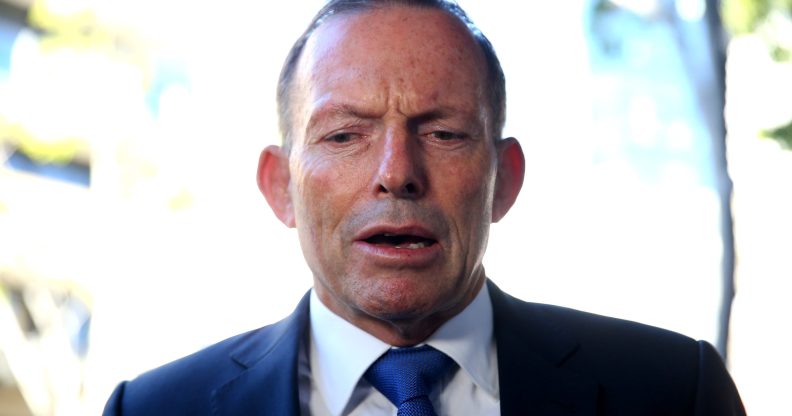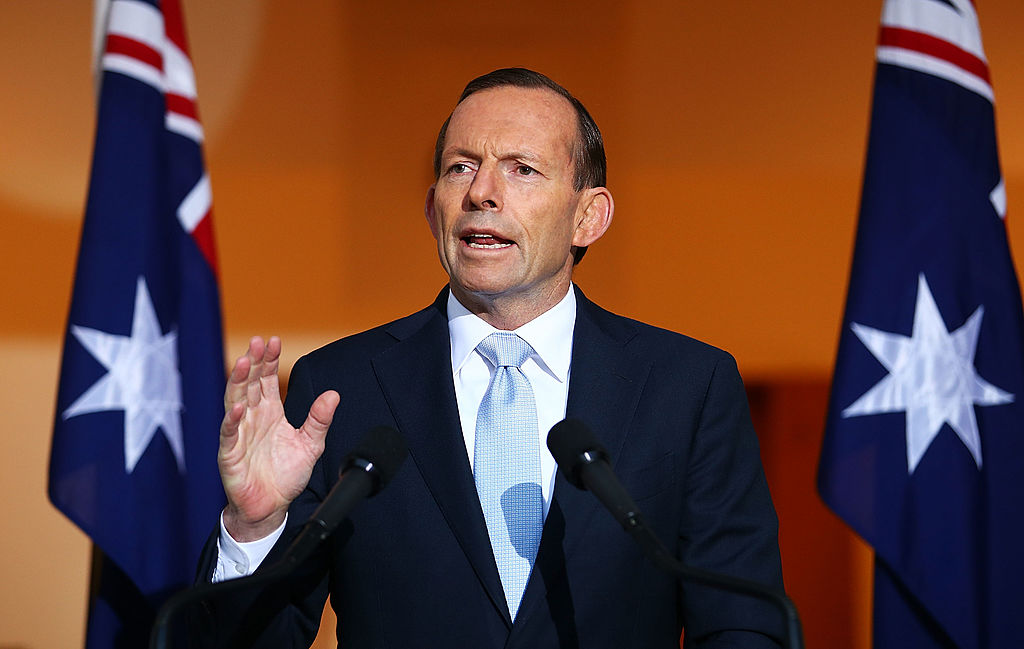7 times Tony Abbott, Britain’s new unelected trade chief, proved himself a ‘homophobic, misogynist’ bigot

Tony Abbott is rumoured to be taking a key role in Britain’s trade future. (Getty)
Tony Abbott has been confirmed as a trade adviser to the British government despite his long history of homophobic and misogynist comments.
Downing Street confirmed Friday (August 4) that the former Australian prime minister will take an unpaid role advising the government on trade deals, but will not represent the nation in talks.
It comes after a week in which Conservative ministers fell over themselves to defend Abbott as LGBT+ activists and others criticised his suitability.
On Thursday morning (September 3) it was health secretary Matt Hancock’s turn to defend Abbott, who will reportedly take a key role striking trade deals on behalf of Britain despite concerns over his legacy of bigotry.
When Sky News’ Kay Burley put it directly to Hancock that Abbott is a “homophobe and misogynist”, the embattled health chief helpfully added: “He’s also an expert on trade!”
Bleakly parroting Abbott’s CV – he’s a former prime minister of Australia, in case you didn’t know – Hancock’s embarrassing turn echoed that of his colleague, international trade secretary Liz Truss a week prior.
Truss – whose other job, as equalities minister, is to combat discrimination – told ITV August 28 that she finds her rumoured new colleague’s war on same-sex marriage and his disdain for 51 per cent of the population completely “irrelevant”.
“What I’d say about Tony Abbott is he’s a former prime minister of Australia,” she added.
“Tony Abbott is a homophobe and a misogynist”
Health Sec @MattHancock: “He’s also an expert on trade”#KayBurley
— Kay Burley (@KayBurley) September 3, 2020
Indeed, Abbott was once – if you didn’t get the memo – leader of Australia. But his legacy is hardly one to boast about.
He was elected in September 2015, after support for the incumbent Labor party crumbled amid a series of personnel changes.
Though he is currently being lauded for his trade skills, this is not what he is remembered for in the role.
Instead, there are gaffes: eating a raw onion on camera, as if it were an apple; and knighting Prince Phillip, the same man who once asked an Indigenous Australian, on a 2002 visit, “Do you still throw spears at each other?” There are political failures: most notably, his infamous first budget which broke with his election promises and was described as “a declaration of war on the poor and marginalised”. And then, there are all the times he proved himself a hateful bigot.
1. Tony Abbott on who does the ironing.
When discussing the price of electricity as opposition leader in 2010, Abbott tried to put things in terms he felt women would understand.
“What the housewives of Australia need to understand as they do the ironing is that if they get it done commercially it’s going to go up in price and their own power bills when they switch the iron on are going to go up,” he said.
This was referenced, along with a catalogue of other offensive comments, by then-prime minister Julia Gillard in her famous 2012 misogyny speech, which saw her castigate Abbott for his many offensive comments.
2. On feeling threatened by LGBT+ people.
The same year as his “ironing” gaffe, Abbott was asked about his views on homosexuality during a television interview.
“I probably feel a bit threatened, as so many people do,” he told Channel 9’s 60 Minutes. “It’s a fact of life.”
His words sparked outcry from Australia’s LGBT+ community, who decried his comments as “dangerous”.
But rather than apologising, Abbott doubled down on his bigotry, saying in a follow-up interview: “There is no doubt that [homosexuality] challenges, if you like, orthodox notions of the right order of things.”
3. On virginity.
2010 was truly a vintage year for Tony Abbott the sexist.
Speaking to Australian Women’s Weekly on the topic of sex before marriage, he described telling his daughters that their virginities were “the greatest gift you can give someone”.
This was despite Abbott having spent much of his life believing he had fathered a son at 22 with a girlfriend. When the child was 27 years old, DNA testing proved Abbott was not, in fact, the father.
4. On sex work.
Abbott’s first year as prime minister, 2014, saw a rare of example of him getting into trouble without even opening his mouth.
While putting out fires over his botched budget, Abbott appeared on a radio show where a chronically ill 67-year-old named Gloria shared how she’d turned to sex work because of financial troubles.
“I work on an adult sex line to make ends meet, now that’s the only way I can do it,” she said.
Footage showed Abbott winking in response. He later apologised, after being called sexist by critics, and later “sleazy and slimy” by Gloria.

Tony Abbott. (Getty)
5. Tony Abbott on equal marriage being a matter of ‘political correctness’.
In 2017, two years after he was ousted by his own party, became the de facto leader of the anti-marriage equality movement ahead of a referendum on the subject.
Urging Australians to deny LGBT+ couples basic human rights, he attempted to position the vote as a proxy for a larger culture war.
“If you’re worried about religious freedom and freedom of speech, vote no,” he said.
“And if you don’t like political correctness, vote no because voting no will help to stop political correctness in its tracks.”
6. On same-sex parents.
Ahead of the same-sex marriage vote, Turnbull wrote an op-ed in The Australian, Rupert Murdoch’s flagship newspaper.
In it, he moved away from his position that marriage equality was about political correctness, instead denying the realities of same-sex couples with children.
Calling marriage “the basis of family”, he argued “it is not homophobic to maintain that, ideally, children should have both a mother and a father”.
His own child, Frances Abbott, didn’t agree, appearing in a television advert urging Australians to ignore her father.
“It’s well known that within my family we have people that sit on the other side of the fence,” she said in the video.
“It really just doesn’t make sense to me that it is not allowed.”
7. Tony Abbott on same-sex marriage ‘weakening’ the institution – and his lesbian sister putting him right.
In the same Australian essay, Abbott suggested that “broadening marriage” to include same-sex couples “weakens it”, citing statistics from neighbouring New Zealand.
“The best claim for same sex marriage is that it will reinforce stable and committed relationships,” he wrote.
“In New Zealand, though, where civil unions have been allowed for more than a decade and same sex marriage since 2013, the marriage rate has been in the same slow, steady decline as elsewhere in the West.”
His raging campaign against LGBT+ rights came despite the fact his own sister, Sydney councillor Christine Forster, is lesbian and was at the time engaged for a wedding that wasn’t legally permissible.
Forster accused her brother of “misrepresenting” New Zealand’s falling marriage rates – a trend which had been observed since 1999, 14 years before the introduction of marriage equality, she helpfully pointed out.
“There was an upturn in 2013,” she explained. “Only since then has the long-term downward trend, dominated by heterosexuals, resumed.”
It was one of many occasions where she spoke out against her brother. Ultimately, Australia voted “yes” to marriage equality 62 per cent to 38 per cent, and Foster married in February 2018, with Abbott sitting in the front row.

